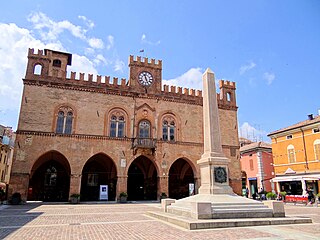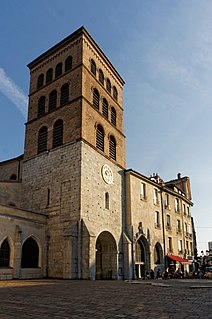This page is based on this
Wikipedia article Text is available under the
CC BY-SA 4.0 license; additional terms may apply.
Images, videos and audio are available under their respective licenses.
Year 345 (CCCXLV) was a common year starting on Tuesday of the Julian calendar. At the time, it was known as the Year of the Consulship of Amantius and Albinus. The denomination 345 for this year has been used since the early medieval period, when the Anno Domini calendar era became the prevalent method in Europe for naming years.

The Syriac Orthodox Church of Antioch, or Syriac Orthodox Patriarchate of Antioch and All the East, is an Oriental Orthodox Church with autocephalous patriarchate established by Severus of Antioch in Antioch in 518, tracing its founding to Antioch by Saint Peter and Saint Paul in the 1st century as described in the Acts of the Apostles, and according to its tradition. It was then restructured by Severus of Antioch in Antioch in 518. The Church uses the Divine Liturgy of Saint James, associated with St. James, the "brother" of Jesus and patriarch among the Jewish Christians at Jerusalem. Syriac is the official and liturgical language of the Church based on Syriac Christianity. The primate of the church is the Syriac Orthodox Patriarch of Antioch currently H.H. Ignatius Aphrem II since 2014, seated in Cathedral of Saint George, Bab Tuma, Damascus, Syria.

The Syriac Catholic Church, also known as Syriac Catholic Patriarchate of Antioch, is an Eastern Catholic Christian Church in the Levant that uses the West Syriac Rite liturgy and has many practices and rites in common with the Syriac Orthodox Church. Being one of the twenty-three Eastern Catholic Churches, the Syriac Catholic Church has full autonomy and is a self-governed sui iuris Church while it is in full communion with the Holy See of Rome.
Patriarch of Antioch is a traditional title held by the Bishop of Antioch As the traditional "overseer" of the first gentile Christian community, the position has been of prime importance in the church from its earliest period. This diocese is one of the few for which the names of its bishops from the apostolic beginnings have been preserved. Today five churches use the title of Patriarch of Antioch: the Syriac Orthodox Church, the Greek Orthodox Church of Antioch, the Syriac Catholic Church, the Melkite Greek Catholic Church, and the Maronite Church. Historically, there has also been a Latin Patriarch of Antioch.

Serapion was a Patriarch of Antioch (191–211). He is known primarily through his theological writings, although all but a few fragments of his works have perished. His feast day is celebrated on October 30.

Saint Lucian of Antioch, known as Lucian the Martyr, was a Christian presbyter, theologian and martyr. He was noted for both his scholarship and ascetic piety.

Fidenza is a town and comune in the province of Parma, Emilia-Romagna region, Italy. It has around 27,000 inhabitants. The town was renamed Fidenza in 1927, recalling its Roman name of Fidentia; before, it was called Borgo San Donnino.

April 19 - Eastern Orthodox liturgical calendar - April 21
Serapion is a given name, a variant of Seraphin.

The Roman Catholic Diocese of Grenoble–Vienne-les-Allobroges is a diocese of the Latin Rite of the Roman Catholic Church in south-eastern France. The diocese, erected in the 4th century as the Diocese of Grenoble, comprises the department of Isère and the former canton of Villeurbanne (Rhône), in the Region of Rhône-Alpes. In 2006, the name was changed from the diocese of Grenoble to the diocese of Grenoble–Vienne. The current bishop is Guy André Marie de Kérimel, appointed on June 10, 2006.

October 8 - Eastern Orthodox liturgical calendar - October 10

The Malankara Rite is the form of the West Syriac liturgical rite practiced by several churches of the Saint Thomas Christian community in Kerala, India. West Syriac liturgy was brought to India by the Syriac Orthodox Bishop of Jerusalem, Gregorios Abdal Jaleel, in 1665; in the following decades the Malankara Rite emerged as the liturgy of the Malankara Church, one of the two churches that evolved from the split in the Saint Thomas Christian community in the 17th century. Today it is practiced by the various churches that descend from the Malankara Church, namely the Malankara Orthodox Syrian Church, the Jacobite Syrian Christian Church, the Syro-Malankara Catholic Church, the Malabar Independent Syrian Church, and the Mar Thoma Syrian Church.
Flavianus—the adjectival form of the name Flavius in Latin—may refer to:

Fidenza Cathedral is a Roman Catholic cathedral dedicated to Saint Domninus of Fidenza in the town of Fidenza, province of Parma, region of Emilia Romagna, Italy.
Saint Domninus of Grenoble was the first recorded bishop of Grenoble. He is venerated as a saint by the Roman Catholic Church; his feast day is celebrated on 2 November.
Saint Domninus of Vienne was a bishop of Vienne in France, venerated as a saint.












